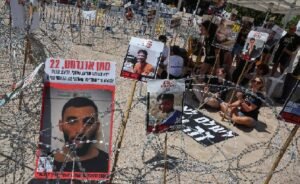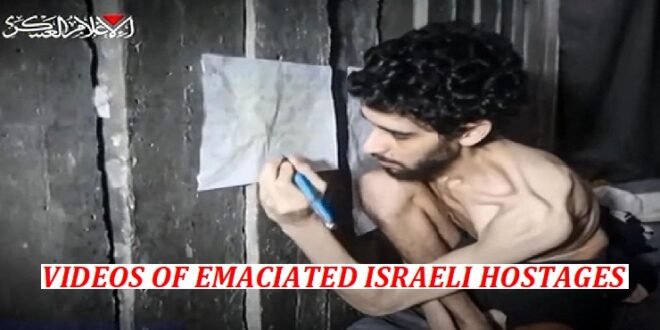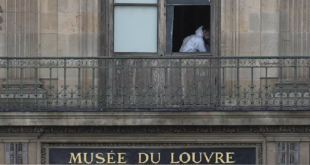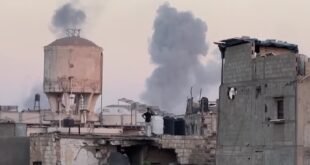05-08-2025
JERUSALEM: Israeli Prime Minister Benjamin Netanyahu has accused Hamas of not wanting a ceasefire deal and requested that the International Red Cross bring food and medical care to hostages held in Gaza, after public fury ignited over propaganda videos showing two emaciated Israeli captives.
 Tens of thousands of protestors joined a rally in Tel Aviv on Saturday evening, some holding placards reading “Stop the war” and “Leave no one behind”, as they called for Netanyahu to strike a deal that would free the Israeli hostages still held in Gaza.
Tens of thousands of protestors joined a rally in Tel Aviv on Saturday evening, some holding placards reading “Stop the war” and “Leave no one behind”, as they called for Netanyahu to strike a deal that would free the Israeli hostages still held in Gaza.
Videos released by the militant groups Hamas and Palestinian Islamic Jihad last week showed hostages Evyatar David and Rom Braslavski in a visibly fragile state images that galvanized a forceful reaction both at home and abroad.
On Sunday, the International Red Cross (ICRC) in Israel and the Occupied Territories said that it was “appalled” by the videos and urged that the “dire situation must come to an end.”
Several world leaders also condemned the videos of the Israel hostages, with French President Emmanuel Macron describing them as “unbearable” and German Chancellor Friedrich Merz saying the images “show that Hamas should have no role in Gaza’s future.”
Netanyahu’s office said on Sunday that the prime minister spoke with Julien Lerisson, the head of the Red Cross delegation in the region, to request “his involvement in the immediate provision of food and medical care for the hostages.”
The office also repeated Netanyahu’s denial that starvation was rife in the enclave, despite an UN-backed food security agency’s warning this week that “the worst-case scenario of famine” is unfolding in Gaza.
Hamas has said it is prepared to “deal positively” with any Red Cross request to deliver food and medicine to hostages, but only on the condition that humanitarian corridors are opened up in Gaza.
 The militant group claims that the hostages’ emaciated state is a reflection of worsening conditions in the strip. However, other hostages who have been freed in the past have similarly appeared gaunt and frail at the time of their release and described malnourishment while in captivity.
The militant group claims that the hostages’ emaciated state is a reflection of worsening conditions in the strip. However, other hostages who have been freed in the past have similarly appeared gaunt and frail at the time of their release and described malnourishment while in captivity.
Abu Obeida, a spokesman for Hamas’ military wing, al-Qassam Brigades, said this weekend that the group does not intentionally starve the hostages, and that they eat the same food that Hamas fighters and the general Gaza population eat. “They will not receive any special privileges amid the crime of starvation and siege,” he added.
A member of Hamas’ political bureau, Izzat Al-Rashiq, described the images as “the definitive response to all who deny the existence of famine in Gaza.”
Malnutrition-related deaths in Gaza spiked in July, the latest sign of a worsening hunger crisis, the World Health Organization warned last week. The agency said the enclave’s malnutrition rates reached “alarming levels,” with over 5,000 children under five admitted for outpatient treatment of malnutrition in just the first two weeks of July.
Gazans also face lethal danger when attempting to collect aid from distribution sites, where violent clashes can erupt. On Sunday, a shooting incident near an aid site in northern Gaza killed at least 13 people and left dozens wounded, according to the Emergency and Medical Services in Gaza.
Allowing Red Cross access would be a shift for Hamas, which has previously opposed any access to the hostages by the humanitarian group. The ICRC, which has only facilitated previous releases of hostages throughout the war, said in March that it was “hugely disappointing” to have not yet been able to visit any hostages so far, emphasizing that it was not for lack of trying. (Int’l News Desk)
 Pressmediaofindia
Pressmediaofindia




